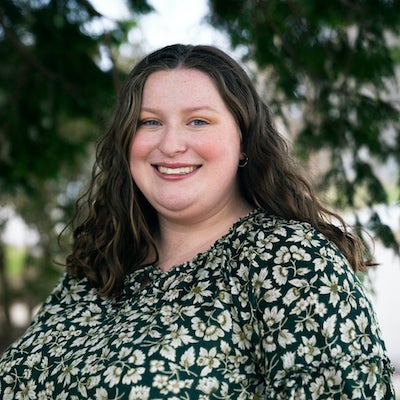Born and raised in a female-dominated family, Emma Hayes ’22 quickly learned to appreciate the experiences and perspectives of women. Inspired by the college-educated women of her family, Emma decided to attend URI in hopes of learning more about gender and how it interacts with various elements of our identities, all of which have a significant impact on our lives. As such, she decided to pursue a major in gender and women’s studies (GWS). “Many of my classes have focused on the inequality of not only women but all marginalized groups,” she says. “The courses aim to analyze the systems of power that prevent groups of people from reaching their potential.” Hayes is also pursuing a communication studies major, a field that complements her objective of not just being able to identify inequities, but also knowing how to effectively campaign against them. “My communication studies courses allow me to recognize that it is important to raise awareness and build networks that are interested in facilitating change,” she says. “Hopefully, with knowledge of how to reach large audiences, I can make the discourse about inequalities more accessible and easier to understand.”
By combining information from both curriculums, Emma used her honors project to bring attention to women’s suffrage and feminist female figures who are often overlooked in history. “When we talk about suffrage we hear about Susan B. Anthony and Elizabeth Cady Stanton, but those women — despite being successful activists — were not always inclusive in their campaigns. I am interested in amplifying the stories and voices of women that history ignores,” she says. Emma’s contributions to women’s suffrage research does not stop there. She was recently featured in a commercial for the suffrage centennial lecture series, where she was allowed to speak more extensively about women’s suffrage. “It was such a cool experience,” she says. “It was a great opportunity alone to do research that highlighted Black women in Rhode Island about their suffrage work because those tales are often ignored. But to talk about it and have the potential to reach a larger audience was super significant.”
Emma now works as an intern at the Providence Preservation Society which allows her to write articles about underrepresented groups and continue to work towards highlighting the experiences of marginalized communities. “Some of my main goals are to write a few blog posts that attempt to humanize some of Providence’s history. Preservation often involves the people who live in these communities and we want to include more of those stories,” she says. As for students who are thinking about majoring in gender and women’s studies, communication studies, or both, Emma says: “I think both majors have the potential to complement any other major or interests. The content of both majors is beneficial to anyone going into the workforce. My classes have not only taught me about the world and different types of people but have taught me about how I handle my own experiences and interactions.”
~Written by Briana Ciceron

